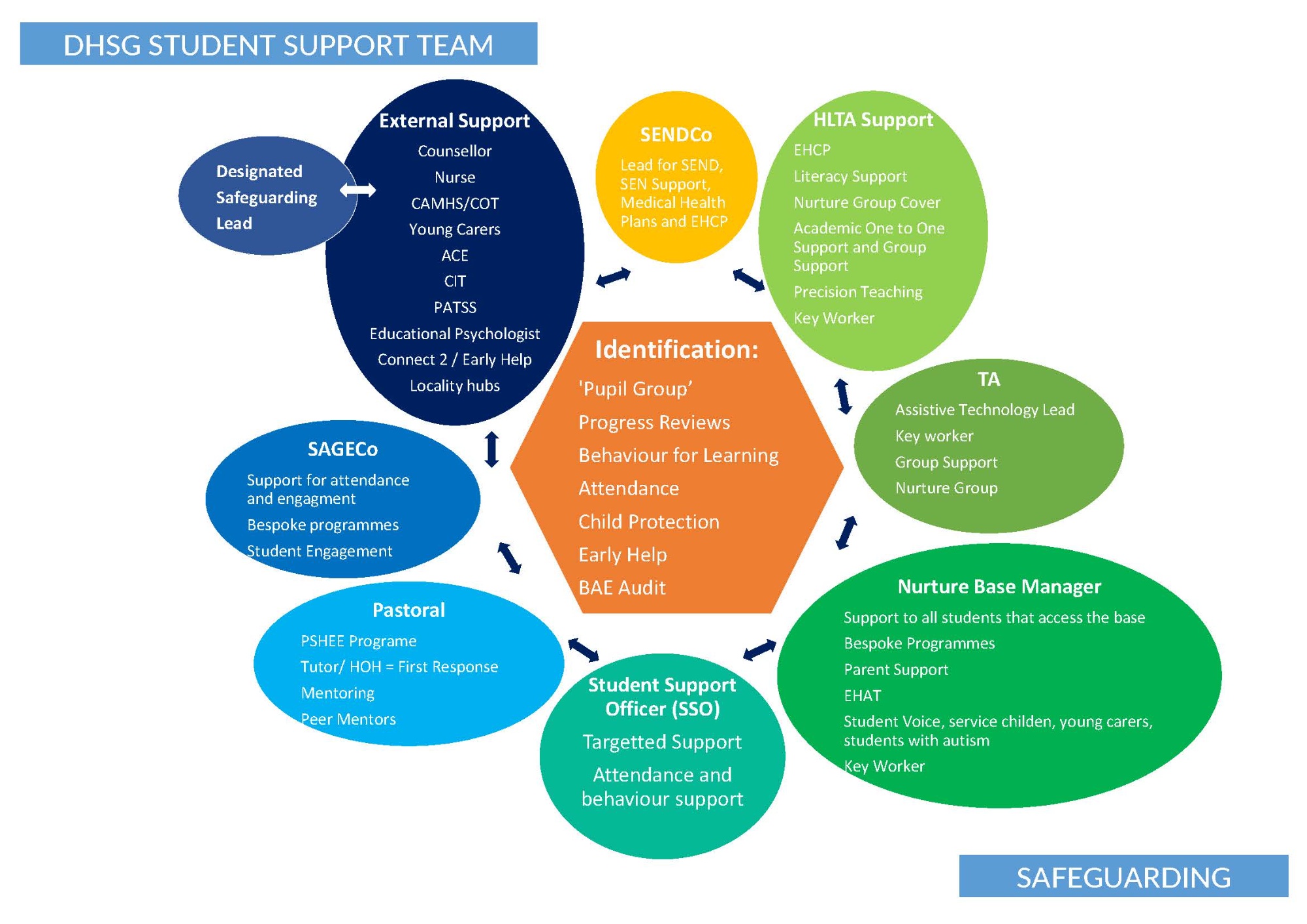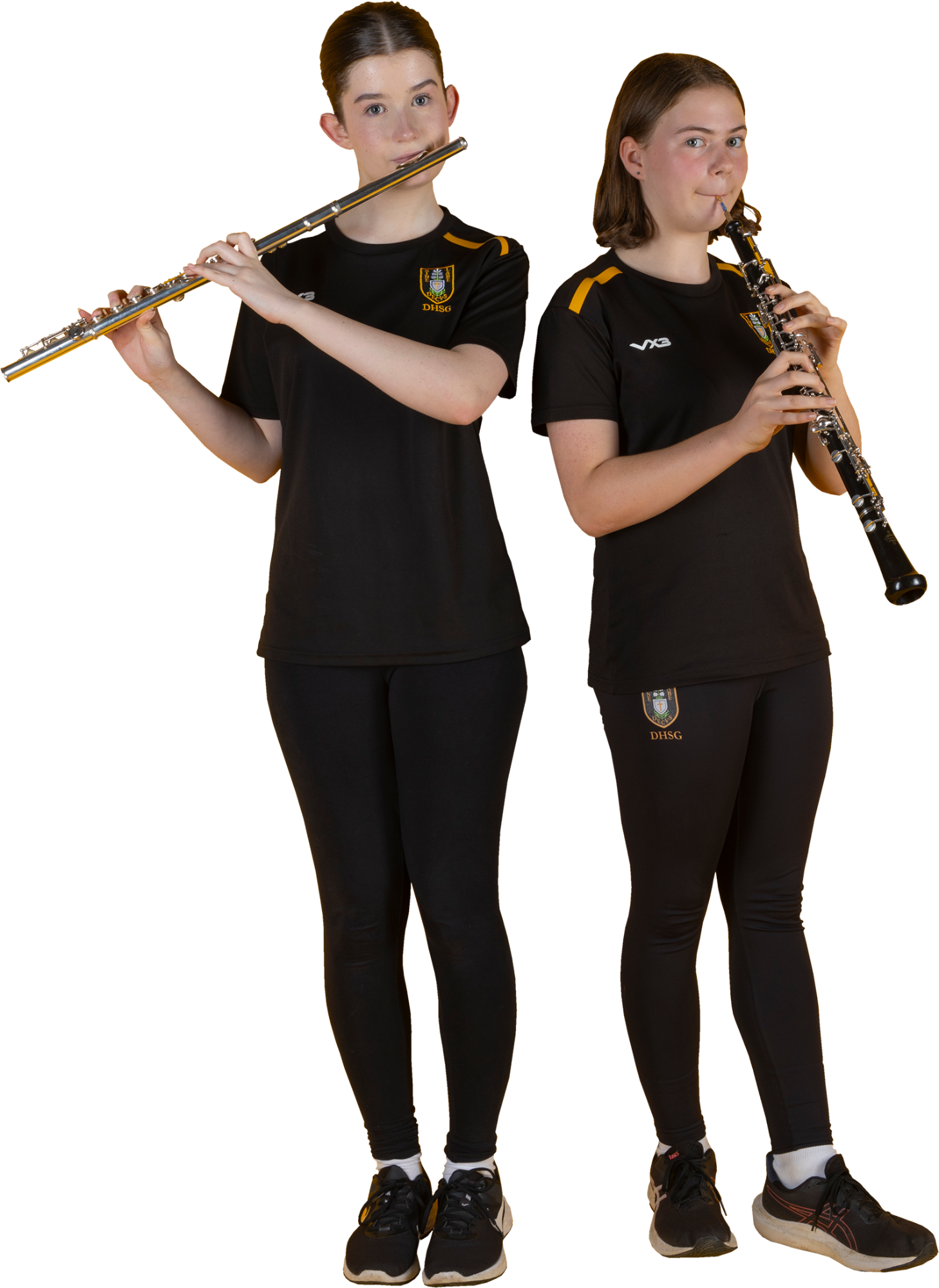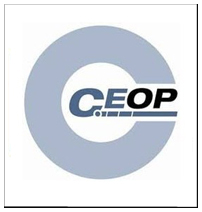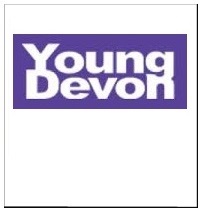Safeguarding and Welfare
Safeguarding and Welfare
Child Protection
DHSG has a responsibility to safeguard and protect the welfare of students. The law requires all school staff to pass on information which gives rise to a concern about a student’s welfare, including risk from neglect, physical, emotional or sexual abuse. This obligation applies to all employees and child protection training is mandatory for all.
"Under the Education Act 2002 (section 175/157), schools must “make arrangements to safeguard and promote the welfare of children”.
We will endeavour to provide a safe and welcoming environment where students are respected and valued.
We will therefore be alert to signs of abuse and neglect and will follow the Plymouth Safeguarding Children Partnership (PSCP) procedures to ensure that students receive appropriate and effective support and protection.
We will discuss any child protection concerns we may have with parents/carers prior to contacting outside agencies, however, in situations where the student is suspected to be at increased risk of harm by doing so, the law says that schools may take advice from other agencies without informing parents/carers.
In accordance with local Information Sharing Protocols and GDPR, we will ensure that information is shared securely and sensitively. Information will only be shared with other services where it is deemed necessary and proportionate to ensure that students are safe and receive the right service.
Under Section 3 (5) of the Children Act 1989, schools or any person who has care of a child “may….do what is reasonable in all the circumstances of the case for the purpose of safeguarding or promoting the child’s welfare”. This means that on very rare occasions, we may need to “hold” a child in school whilst Social Care and the police investigate any concerns further.
If you have any concerns about the safeguarding of a young person contact:
- The Designated Safeguarding Lead: Mrs R Morgan rmorgan@dhsg.co.uk
- Deputy Safeguarding Leads: Dr D Parry dparry@dhsg.co.uk, Mrs H Uttley huttley@dhsg.co.uk and Miss N Stepp nstepp@dhsg.co.uk
- The Trustee with Responsibility for Safeguarding is: Mrs E Blakeman

Please consult the following policy documents on the school website's policy page, for further information. The below policies can be found on the school's policy page:
- Safeguarding and Child Protection Policy
- Anti-Bullying Policy
- Equality Policy
- ICT and Online Safety Policy
Student Report Concern Form
To report an issue to us that is worrying you or if you have seen or heard something involving someone else, and you are worried about them, all our staff are trained and know how to support you to report those concerns in school in person to gain help.
We will protect your confidentiality and ensure you are supported to share this important information in a sensitive manner.
If you would prefer to tell us using an online form, then please complete the Microsoft form below (click on the image).
Your concern form will be received by Mrs Morgan as Designated Safeguarding Lead (DSL) and Dr Parry as Deputy DSL/Senior Head of House and one of us will respond to you. If there is a particular member of staff you would prefer to talk to, please add that to your form.
RELY -There for you
Report Harmful Content
Student Welfare
The pastoral care and support or our students is of paramount importance to us and permeates every aspect of school life. Every member of staff shares a joint responsibility for promoting well-being, as well as the moral, social and spiritual development of students. That students are treated as unique individuals is apparent in the warm relationships and mutual respect evident between students and staff and in the close working relationships we have with parents and carers.
Our commitment to these themes has been judged to be no less than outstanding in inspections to date.
Our ethos is characterised by this relational approach with high levels of support, inclusivity and a practical commitment to welfare underpinning the positive atmosphere in classrooms, high quality teaching and learning and student outcomes.
Students are supported by a contemporary and rigorous PSHEE Programme which immerses them in the complexities of modern life and provides them with the relevant and adaptable life skills they require for an ever-shifting world. Our specific pastoral House structure enables a deep understanding of students' needs through partnership with families and our skilled Student Support Team are relentlessly focussed on meeting these individual needs.
Through strategic leadership of inclusion and Safeguarding we ensure effective and timely multi-agency work that advocates for our students and their families at times of most need, partnering with CAHMS, Young Devon, Barnardo’s and Jerimiah’s Journey amongst others.
We know you want the best for your child and so would ask for your cooperation in keeping us informed of any circumstance that may affect them.
If your child is diagnosed with any new medical condition after they join us in Year 7 please remember to contact your Head of House to update us and allow us to work with you to support your child. If your child becomes ill and is unable to attend school, we will work with you to ensure that their education is not disrupted if at all possible. We will support their reintegration back into school after illness with a variety of measures to reduce any potential anxieties.
We know you will be keen to assist us in removing any potential barriers to progress, as you are as keen as we are to see your child achieving their full potential in school. If you wish to seek advice about any matter of a confidential nature that may affect the wellbeing of your child, please contact Mrs Ruth Morgan who is the Assistant Head Teacher in charge of Inclusion and also the Designated Safeguarding Lead.

DHSG School based Counselling offer
Rationale
- The counselling service at school is there to support student welfare and mental health in the context of holistic Pastoral Support and is a confidential service.
- We employ counsellors from external providers who see students on site at DHSG. The counsellor manages their clients via the procedures and practices of their service.
- The service is a limited resource and will be targeted efficiently and strategically to be most effective in its aims and outcomes. Primarily, this is to support students in accessing their education by reducing stress and anxiety. Students approaching key examinations will be prioritised.
- Additional professional services are available for referral in cases of high need, such as CAMHS and the early help assessment will be actioned where student welfare is impacted significantly by multiple factors.
Referrals to the Counselling service
- No referral should be made without the prior knowledge of the student.
- All recommendations made by staff for the referral of students to the Counsellor, should be made via the Heads of House/ Head of Sixth.
- Heads of House/ Head of Sixth will discuss each recommendation with the SLT lead for Inclusion and complete a Student Support Team referral. This is so that the waiting list can be managed effectively to target highest need.
- Students may self-refer directly, but if they choose not to share their reasons for requesting the service, it may not be possible to prioritise them above other known high need cases.
- Parents/carers may refer via their child’s tutor or Head of House.
- We will always seek to work closely with Parents/carers to support good mental health but will not routinely inform that their child is accessing this service.
If you have any questions about the school counselling offer please contact Mr Alan Thomas, the Inclusion Lead.
Young Carers
Young carers are under 18’s who may have to emotionally or physically support a family member who has a disability, illness or addiction. On average, there are 250,000 young carers in the UK alone. As a school, we provide support, guidance and monitor individual needs closely so that additional external support is considered at an early stage if it becomes evident it is needed. We work closely with Barnardo’s and the Youth Service. Please contact your child’s Head of House for further information.
For more information on internet safety and CEOP's work, Young Devon, or Kooth visit the websites below:








